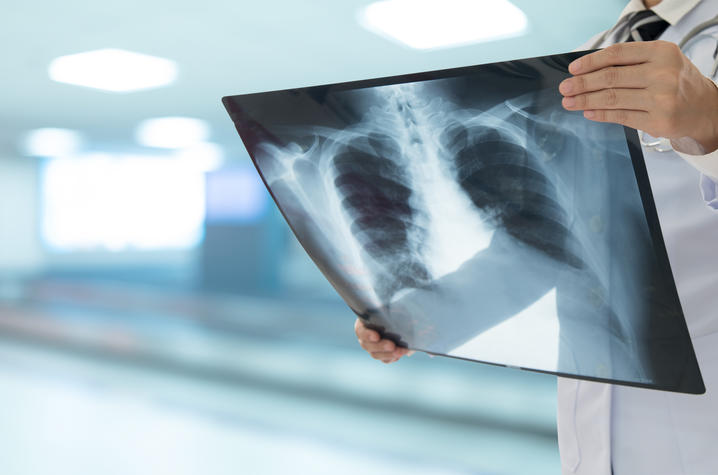Markey researchers help discover diet, lung cancer link

LEXINGTON, Ky. (March 28, 2025) — In a new study that challenges long-held views on lung cancer, University of Kentucky Markey Cancer Center researchers have discovered a surprising link to diet. The collaborative study with University of Florida’s UF Health Cancer Center identifies glycogen — the body’s stored form of glucose — as a key driver in lung adenocarcinoma, one of the most common forms of lung cancer.
The findings, published in Nature Metabolism and supported by the National Institutes of Health, show that a high-fat, high-carbohydrate “Western diet” increases glycogen levels in the lungs, accelerating tumor growth and worsening patient outcomes. When glycogen synthesis was blocked, tumor growth was dramatically suppressed.
Lung adenocarcinoma accounts for about 40% of all lung cancers worldwide and is often diagnosed at advanced stages. This research suggests that prioritizing a nutrient-rich diet and maintaining an active lifestyle could be powerful tools in lung cancer prevention — adding “eat better” to the well-known “don't smoke” guidance for lung health.
Matthew Gentry, Ph.D., and Ramon Sun, Ph.D., now at the University of Florida, led the study, which they began at UK. Several current UK Markey Cancer Center researchers contributed to the study, including Derek Allison, M.D., an associate professor in UK College of Medicine’s Department of Pathology and Laboratory Medicine, who served as principal investigator of UK’s sub-award and pathologist for the study, and Christine Brainson, Ph.D., an associate professor in UK College of Medicine’s Department of Toxicology and Cancer Biology.
“Lung cancer has not traditionally been thought of as a dietary-related disease,” said Brainson. “This discovery changes our understanding of lung adenocarcinoma metabolism and opens new possibilities for both prevention and treatment strategies.”
Using advanced spatial metabolomics techniques, the research team found that patients with higher glycogen content in their tumors had shorter survival. The study showed that glycogen was an “exceptionally good predictor” of tumor growth and mortality in lung adenocarcinoma patients.
The research team also identified three types of drugs that target glycogen levels, which could potentially be repurposed for lung cancer treatment. This research grew out of work led by Gentry and Sun on Lafora disease, a rare neurological disorder where glycogen accumulates in brain cells.
Research reported in this publication was supported by the National Cancer Institute of the National Institutes of Health under Award Numbers R01CA237643 and P30CA177558 and the National Institute of General Medical Sciences of the National Institutes of Health under Award Number P20GM121327. The content is solely the responsibility of the authors and does not necessarily represent the official views of the National Institutes of Health.
UK HealthCare is the hospitals and clinics of the University of Kentucky. But it is so much more. It is more than 10,000 dedicated health care professionals committed to providing advanced subspecialty care for the most critically injured and ill patients from the Commonwealth and beyond. It also is the home of the state’s only National Cancer Institute (NCI)-designated Comprehensive Cancer Center, a Level IV Neonatal Intensive Care Unit that cares for the tiniest and sickest newborns and the region’s only Level 1 trauma center.
As an academic research institution, we are continuously pursuing the next generation of cures, treatments, protocols and policies. Our discoveries have the potential to change what’s medically possible within our lifetimes. Our educators and thought leaders are transforming the health care landscape as our six health professions colleges teach the next generation of doctors, nurses, pharmacists and other health care professionals, spreading the highest standards of care. UK HealthCare is the power of advanced medicine committed to creating a healthier Kentucky, now and for generations to come.




